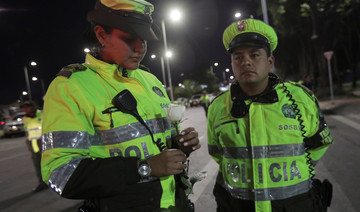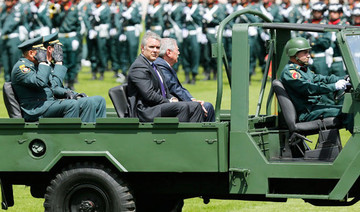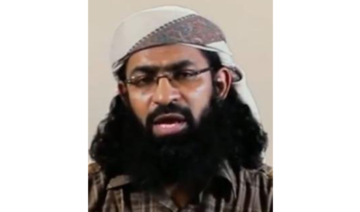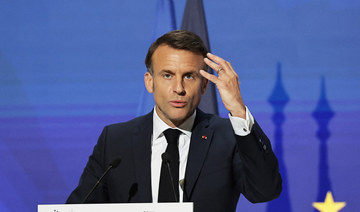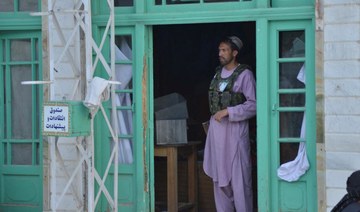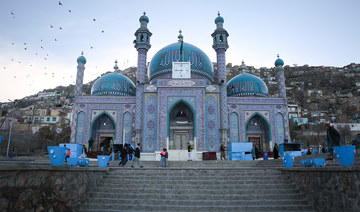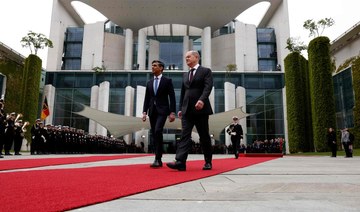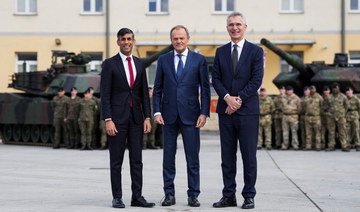BOGOTA: Colombian President Ivan Duque on Friday demanded Cuba arrest 10 peace negotiators from the National Liberation Army after his government blamed the leftist group for a car bombing against a police academy that left 21 dead and dozens more wounded.
In a televised address, the conservative leader said he had revoked a decree suspending arrest orders against leaders of Colombia’s last remaining rebel group, known as the ELN for its Spanish initials, who have been living on the communist-run island amid fading hopes that peace talks would resume.
“It’s clear to all of Colombia that the ELN has no true desire for peace,” Duque said, citing a long list of 400 terrorist attacks attributed to the guerrillas since peace talks began in 2017.
“We would like to thank the Cuban government for the solidarity it expressed yesterday and today, and we ask that it capture the terrorists who are inside its territory and hand them over to Colombian police,” he said, adding that no ideology could justify the cruelty of Thursday’s attack.
Duque’s comments came after authorities claimed that a one-armed ELN explosives expert was the person who carried out the attack, the deadliest in the South American nation in 15 years.
Even though Jose Aldemar Rojas had no criminal record, authorities said that the 56-year-old man is the same individual who shows up in intelligence reports as alias Mocho Kiko. He is believed to have lost part of his right arm manipulating explosives during a long clandestine career with an ELN cell near the border with Venezuela. He died in Thursday’s attack.
The shock bombing recalled some of the bloodiest chapters of Colombia’s recent past and has raised tough questions about lingering security threats in the wake of a 2016 peace deal with the larger and far more lethal Revolutionary Armed Forces of Colombia.
It would also appear to mark Duque’s return to the law and order platform on which he was elected last year but then somewhat moderated once he took office.
While Duque stopped short of shutting the door entirely to a negotiated end to decades of fighting with the ELN, he repeated his demands that the groups immediately cease all attacks and release 16 people it is believed to be holding captive as a condition for restarting stalled talks.
He also vowed to condemn any government that provides safe haven to the group — an indirect shot at Venezuela, considered by some a valuable rearguard for the clandestine cell that Rojas is accused of belonging to.
“Systematic deception and irrational violence have been the constant in three decades of failed talks with the ELN,” said Duque, who earlier in the day fielded phone calls of support from several foreign leaders as well as US Secretary of State Mike Pompeo.
Cuba, which had been sponsoring peace talks and helped broker the historic 2016 deal with the FARC, again offered its condolences to Colombia on Saturday.
Cuba’s foreign ministry “will act with strict respect for the Protocols of Dialogue and Peace signed by the Government and the ELN, including the Protocol in Case of a Rupture in Negotiations,” wrote foreign minister Bruno Rodriguez.
Cuba has strongly condemned terror activities and expressed its solidarity with Duque’s government, even canceling a reception at its embassy in Bogota to commemorate the 60th anniversary of Fidel Castro’s revolution.
Overnight, the death toll from the bombing more than doubled to 21, the worst tragedy since a 2003 car bombing carried out by FARC rebels against an elite Bogota social club that killed 36. It proved especially unsettling because the target, the General Santander police academy, is one of the city’s most protected installations.
With the help of security cameras and fingerprints on his one-remaining hand, investigators were able to quickly identify Rojas and determine that he was the owner and driver of a 1993 Nissan-pick up that was loaded with 80 kilograms (175 pounds) of pentolite carried out the attack.
Defense Minister Guillermo Botero said Rojas entered the heavily guarded facility via a side entrance used for deliveries, driving fast through a gate opened to allow the exit of a few motorcycles. He then maneuvered into the heart of the leafy campus where the vehicle exploded in front of a red tile-roofed barrack used by female cadets just after an honor ceremony had ended.
Less than 10 minutes before the blast an unidentified man descended from the vehicle at a nearby bus stop — an indication the bomb may have been activated remotely and not an unprecedented suicide bombing as some had initially speculated.
Investigators are now trying to determine whether that man is Ricardo Carvajal, who acknowledged taking part in the attack in phone calls intercepted by police. Carvajal was arrested in a pre-dawn raid in Bogota on Friday in which authorities also seized a rebel combatant manual.
“This was an operation being planned for more than 10 months,” Botero said.
Only a small number of the 20 deceased cadets have been fully identified because the bodies of the young victims were badly mutilated. Family members have been asked to provide DNA samples to a team of forensic anthropologists trying to identify the dead from among a list of unaccounted-for cadets.
The dead identified thus far include Erika Chico, a top-of-class cadet from Ecuador who had identification on her at the time of the attack. Of the more than 70 wounded, including three students from Panama, 10 remain hospitalized. Also killed was Alan Bayona, who just a few years ago outsprinted 100 other athletes at 800-meters in a nationwide track championship.
Little is known about Rojas.
Records show he bought the car 10 months ago from Mauricio Mosquera, who authorities said was charged in the past for terrorism and rebellion. The car was last inspected six months ago in the eastern city of Arauca, near the border with Venezuela.
The same border region is a stronghold of the ELN, which has been stepping up its attacks on police targets and oil infrastructure in the volatile area. Authorities said Rojas traveled on several occasions to Venezuela to train rebels in the use of explosives.
In the past two decades the Cuban revolution-inspired group, which is believed to have around 1,500 fighters, has never been capable or shown much interest in carrying out high-profile act of violence.
But they’ve gained strength since the 2016 peace accord with the FARC led to the demobilization of some 7,000 guerrillas
Jorge Restrepo, director of the Conflict Analysis Resource Center, said the ELN’s decentralized and politically-fragmented leadership is a major obstacle to peacemaking.
He said the Domingo Lain front to which Rojas is believed to have belonged may have been looking to sabotage the outreach efforts of the ELN leadership in Cuba, who likely had little idea such an assault was in the works. The same unit was behind a similar remotely-activated car bombing of a police station in the coastal city of Barranquilla a year ago that left five officers dead.
“They are one of the strongest militarily and one of the least committed to the peace process,” he said of the hard-line cell.
Colombia asks Cuba to arrest ELN negotiators for car bombing
Colombia asks Cuba to arrest ELN negotiators for car bombing
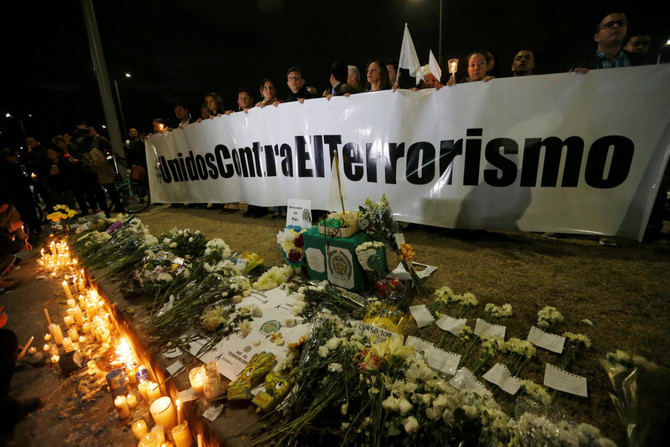
- ‘It’s clear to all of Colombia that the ELN has no true desire for peace’
- The Cuban revolution-inspired group, which is believed to have around 1,500 fighters, has never been capable or shown much interest in carrying out high-profile act of violence
Resurgent terror groups in Afghanistan will strike West, warns resistance leader

- Exiled head of National Resistance Front says Al-Qaeda, Daesh presence growing in country
- Taliban emboldened by Western commitment to Ukraine, focus on Middle East
London: Terrorist groups in Afghanistan are regrouping in the wake of the Western evacuation from the country and will strike on US and European soil, the leader of an anti-Taliban movement has warned.
The exiled leader of Afghanistan’s National Resistance Front, Ahmad Massoud, said a terror attack in the US or Europe is “not about a matter of if, it’s a matter of when,” The Independent reported.
Massoud said circumstances in the country and the wider region resemble the pre-9/11 landscape, with terror training camps opening across Afghanistan.
Ali Maisam Naziry, the NRF’s head of foreign relations, said of the resurgent groups: “The attacks in Russia, Iran and Brussels, and the neutralised attack in Germany, are examples of how fast they are moving to threaten global security.”
He added that since the Taliban’s return to power in 2021, Afghanistan has witnessed a “massive influx” of foreign terrorist fighters who belong to the more than 20 militant networks operating in the country, including Al-Qaeda, Daesh-Khorasan and the Haqqani Network.
Massoud warned that the West’s commitment to Ukraine and Israel is serving as a distraction, emboldening the Taliban in the process.
Afghanistan is “no longer a priority” for the Biden administration in the US, he told The Independent last year.
Nathan Sales, a former US ambassador-at-large and coordinator for counterterrorism, said last year: “The continued partnership between the Taliban and Al-Qaeda is perhaps best seen in the fact that after the US withdrawal, Al-Qaeda leader Ayman Al-Zawahiri resurfaced in Afghanistan, living in a safe house associated with the Haqqani Network, a Taliban faction that maintains close ties to Al-Qaeda and is itself a US-designated Foreign Terrorist Organization.
“The key takeaway is that the Taliban felt emboldened to welcome Al-Qaeda’s leader back to Kabul, and Al-Qaeda’s leader felt it was safe enough there to accept the offer.”
Sudanese man detained in UK for deportation to Rwanda: NGO

- Asylum seeker attended routine sign-in at immigration center in London on Monday
- Home Office: First flight to African country ‘set to take off in 10-12 weeks’
LONDON: A Sudanese asylum seeker in the UK has been told of his imminent deportation to Rwanda after attending a routine Home Office appointment, The Guardian reported.
SOAS Detainee Support, an NGO, told the newspaper that the case is believed to be the first under the Rwanda scheme, which has received royal assent.
The UK government policy aims to deport rejected asylum seekers to the African country through a bilateral agreement.
The Sudanese man said he had arrived on Monday to sign in at the Lunar House immigration reporting center in Croydon, south London, but was told he would be deported to Rwanda, and was subsequently detained.
He is one of three people being held after attending the facility, including an Afghan national, SDS said.
The NGO, which offers advice and support to detained asylum seekers, said it had received an “alarmingly high number of calls” since the government’s announcement of Rwanda flights.
A Home Office spokesperson said in a statement: “Now that the Safety of Rwanda Act has passed and our treaty with Rwanda ratified, government is entering the final phase of operationalising this landmark policy to tackle illegal migration and stop the boats.
“This includes detaining people in preparation for the first flight, which is set to take off to Rwanda in 10-12 weeks.”
Daesh claims gun attack killing six in Afghan mosque
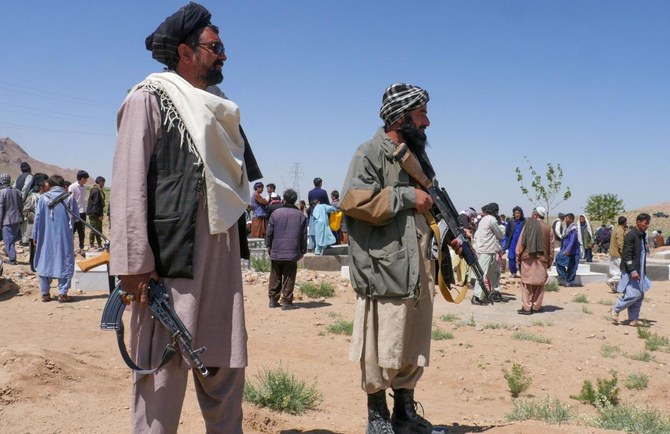
- Daesh said numerous gunmen had stormed the mosque with machine guns
HERAT: The Daesh group has claimed a gun attack on a minority Shiite mosque in western Afghanistan that killed six people on Monday.
Interior ministry spokesman Abdul Mateen Qani said Tuesday morning that “an unknown armed person shot at civilian worshippers in a mosque” in Herat province’s Guzara district at around 9:00 p.m. (1630 GMT) the previous night.
“Six civilians were martyred and one civilian was injured,” he wrote on social media platform X.
Late Tuesday, the regional chapter of Daesh group claimed responsibility and said numerous gunmen had stormed the mosque with machine guns — contradicting the official account of a single assailant.
Locals said the mosque, located just south of provincial capital Herat, served the minority Shiite community and that an imam and a three-year-old child were among those killed.
They said a team of three gunmen had staged the attack.
“One of them was outside and two of them came inside the mosque, shooting the worshippers,” said 60-year-old Ibrahim Akhlaqi, the brother of the slain imam. “It was in the middle of prayers.”
“Whoever was in the mosque has either been martyred or wounded,” added 23-year-old Sayed Murtaza Hussaini.
Taliban authorities have frequently given death tolls lower than other sources after bombings and gun attacks, or otherwise downplayed them, in an apparent attempt to minimize security threats.
Daesh in Afghanistan
The regional chapter of Daesh is the largest security threat in Afghanistan and has frequently targeted Shiite communities.
The Taliban government has pledged to protect religious and ethnic minorities since returning to power in August 2021, but rights monitors say they’ve done little to make good on that promise.
The most notorious attack linked to Daesh since the Taliban takeover was in 2022, when at least 53 people — including 46 girls and young women — were slain in the suicide bombing of an education center.
Taliban officials blamed Daesh for the attack, which happened in a Shiite neighborhood of the capital Kabul.
Afghanistan’s new rulers claim to have ousted IS from the country and are highly sensitive to suggestions the group has found safe haven there since the withdrawal of foreign forces.
A United Nations Security Council report released in January said there had been a decrease in Daesh attacks in Afghanistan because of “counter-terrorism efforts by the Taliban.”
But the report said Daesh still had “substantial” recruitment in the country and that the militant group had “the ability to project a threat into the region and beyond.”
The Daesh chapter spanning Afghanistan, Pakistan and Central Asia claimed responsibility for the March attack on the Crocus City Hall concert venue in Moscow, killing more than 140 people.
It was the deadliest attack in Russia in two decades.
UK local polls could determine PM Sunak’s fate
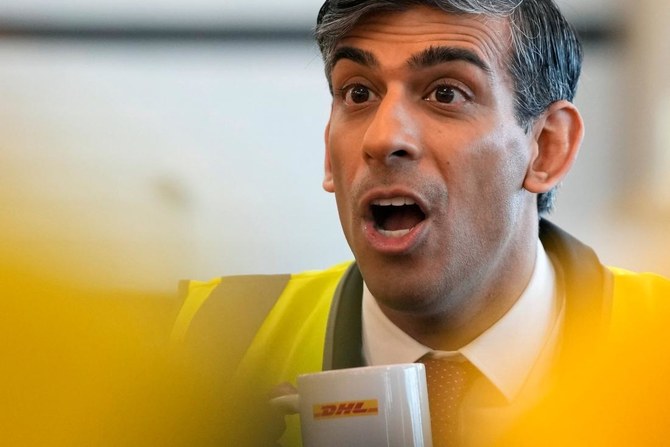
- The polls are the last major electoral test before a general election that Sunak’s party, in power since 2010, seems destined to lose to the Labour opposition
London: Britain’s ruling Conservative party is expected to suffer heavy losses in crunch local elections this week that are likely to increase pressure on beleaguered Prime Minister Rishi Sunak.
The polls are the last major electoral test before a general election that Sunak’s party, in power since 2010, seems destined to lose to the Labour opposition.
Sunak has said he wants to hold the nationwide vote in the second half of the year, but bruising defeats in Thursday’s votes could force his hand earlier.
“These elections form a vital examination for the Sunak premiership — road-testing its claim that the plan is working and the degree to which voters still lend that notion any degree of credibility,” political scientist Richard Carr told AFP.
Incumbent governments tend to suffer losses in local contests and the Conservatives are forecast by pollsters to lose about half of the council seats they are defending.
Sunak’s immediate political future is said to rest on whether two high-profile Tory regional mayors get re-elected in the West Midlands and Tees Valley areas of central and northeast England.
Wins for the Conservative mayors, Andy Street and Ben Houchen, would boost hopes among Tory MPs that Sunak can turn around their party’s fortunes in time for the general election.
But speculation is rife in the UK parliament that a bad showing could lead some restive Conservative lawmakers to try to replace Sunak before the nationwide poll.
“If Andy Street and Ben Houchen both lose, any idea that Sunak can carry on is surely done,” said Carr, a politics lecturer at Anglia Ruskin University.
“Whether that means he rolls the dice on a general election or gets toppled remains to be seen.”
Factional infighting has plagued the Tories in recent years, serving up five prime ministers since the 2016 Brexit vote, including three in four months from July to October 2022.
A group of restive Conservative MPs have drawn up a “policy blitz” for a potential successor to Sunak in the event of massive losses this week, British media have reported.
Some observers say it would be madness for the Conservatives to topple another leader when Sunak has provided some stability since succeeding Liz Truss in October 2022.
Others say the party’s credibility is already shot so why not try one last desperate throw of the dice to try to stop a predicted Labour landslide.
Some 52 MPs would need to submit letters of no confidence in Sunak to trigger an internal party vote to replace him — a tall ask.
“I still expect Sunak will lead the Conservatives into the general election,” Richard Hayton, a politics professor at Leeds University, told AFP.
“But some MPs may seek to move against him, which will further damage his standing with the general public.”
Sunak, 43, was an internal Tory appointment following Truss’s disastrous 49 days premiership in which her unfunded tax cuts caused market turmoil and sank the pound.
Despite numerous leadership resets under Sunak, the Tories have continued to trail Labour, led by Keir Starmer, by double digits in most opinion polls.
An Ipsos poll earlier this month put Sunak’s satisfaction rating at a joint all-time low of minus 59 percent.
More than 2,500 councillors are standing in England on Thursday, as well as London’s Labour mayor Sadiq Khan who is seeking a record third term in office.
Most of the council seats up for re-election were last contested in 2021, when ex-Tory premier Boris Johnson was popular as he rolled out Covid-19 vaccines.
UN Human Rights Chief troubled by ‘heavy-handed’ action against protesters at US colleges
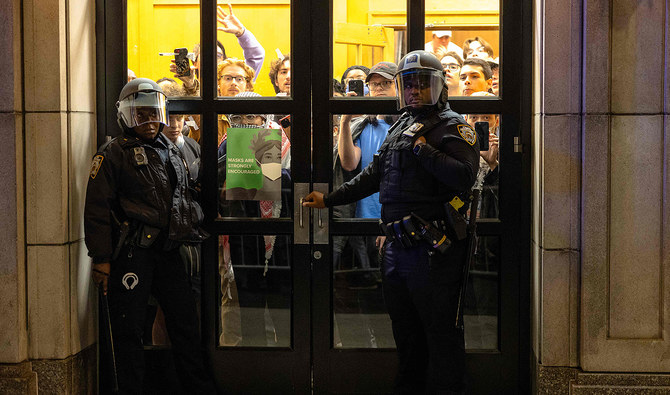
- Volker Turk says ‘freedom of expression and the right to peaceful assembly are fundamental to society, particularly when there is sharp disagreement on major issues’
- Protests have taken place on campuses in several states as students demand colleges withdraw investments from businesses involved in Israel’s assault on Gaza
NEW YORK CITY: The UN’s high commissioner for human rights on Tuesday said he is troubled by “a series of heavy-handed steps” taken by education authorities and law enforcement officials to break up protests at college campuses in the US.
Volker Turk said: “freedom of expression and the right to peaceful assembly are fundamental to society, particularly when there is sharp disagreement on major issues, as there are in relation to the conflict in the Occupied Palestinian Territory and Israel.”
Pro-Palestinian demonstrations have spread across college campuses in Texas, New York, Atlanta, Utah, Virginia, New Jersey, California and other parts of the US as students protest against the death toll during the war in Gaza, call for a ceasefire and demand authorities at their colleges withdraw investments from businesses involved in Israel’s military assault on Gaza.
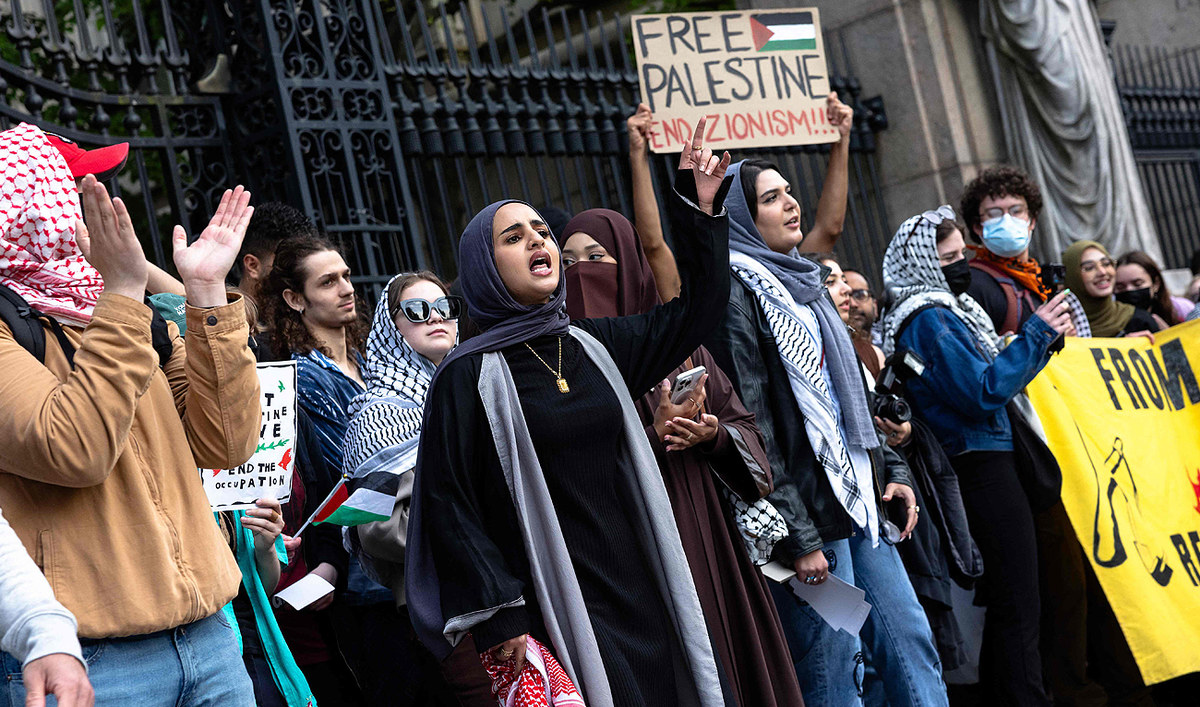
Though largely peaceful, at some locations the protests have been dispersed or dismantled by security forces. Hundreds of students and teachers have been arrested, some of whom face charges or academic sanctions.
Turk expressed concern that some of the responses by law enforcement authorities at several colleges might have been disproportionate, and called for such actions to be scrutinized to ensure they do not exceed what is necessary “to protect the rights and freedoms of others.”
He added that all such actions must be guided by human rights law, while “allowing vibrant debate and protecting safe spaces for all.”
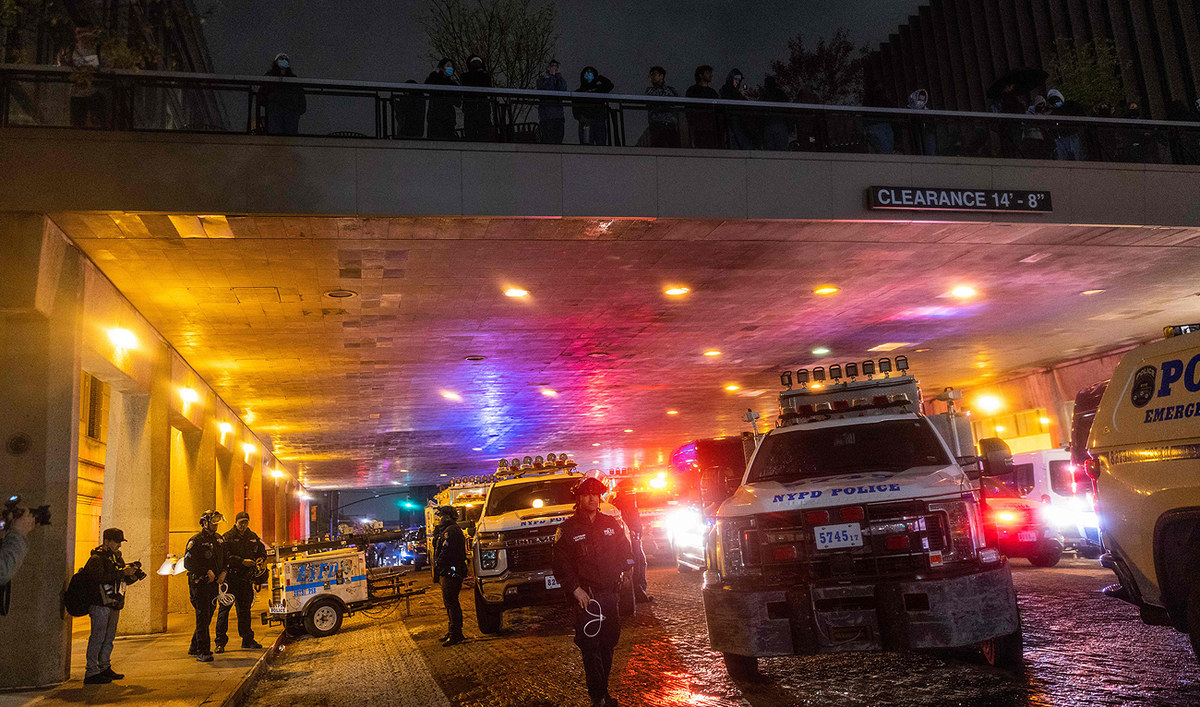
He reiterated that antisemitic, anti-Arab and anti-Palestinian activities and speech are “totally unacceptable, deeply disturbing (and) reprehensible.” However, the conduct of protesters must be assessed and addressed individually rather than through “sweeping measures that impute to all members of a protest the unacceptable viewpoints of a few,” Turk added.
“Incitement to violence or hatred on grounds of identity or viewpoints, whether real or assumed, must be strongly repudiated. We have already seen such dangerous rhetoric can quickly lead to real violence.”



